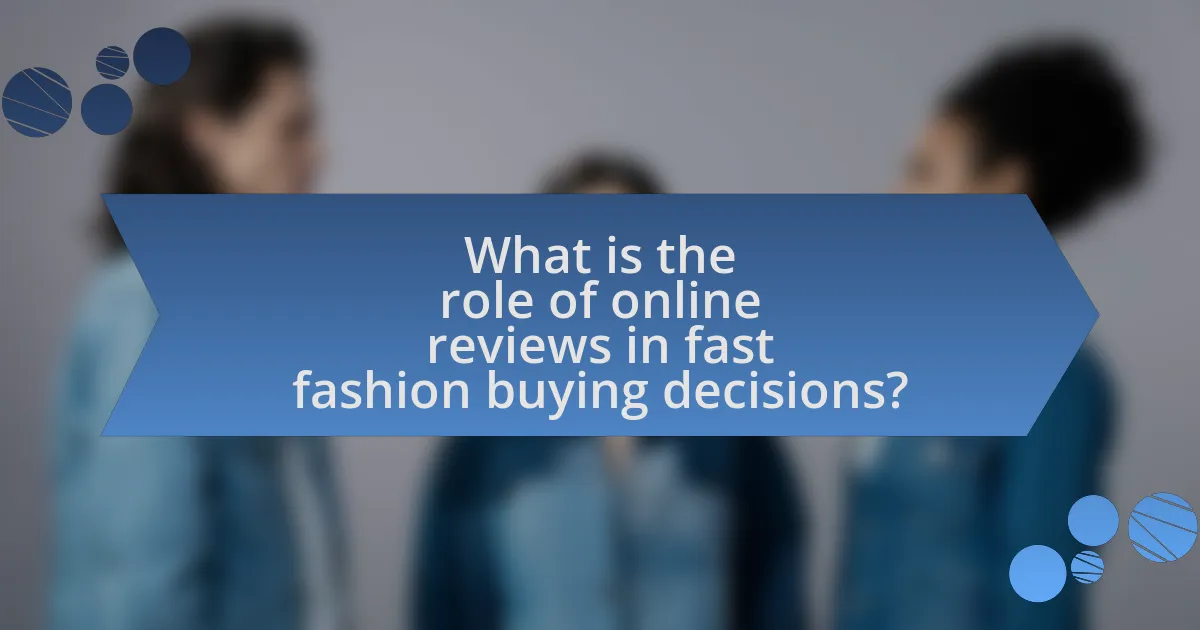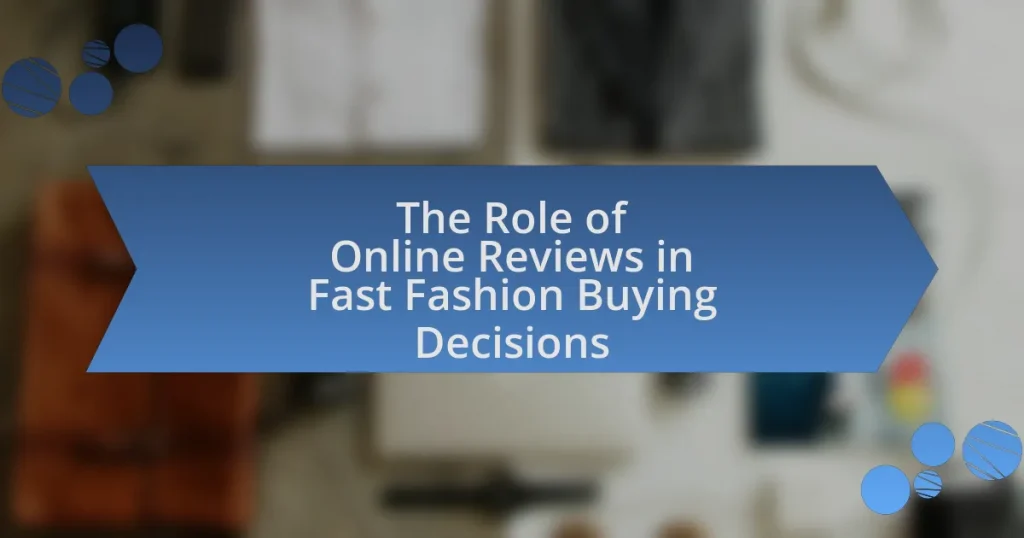The article examines the significant role of online reviews in influencing buying decisions within the fast fashion industry. It highlights that 79% of consumers trust online reviews as much as personal recommendations, underscoring their impact on brand perception and sales. Key factors affecting consumer trust include review authenticity, volume, and overall ratings, while both positive and negative reviews shape brand image and consumer loyalty. The article also discusses the importance of managing online feedback, the effectiveness of user-generated content versus influencer reviews, and strategies for fast fashion brands to leverage online reviews in their marketing efforts.

What is the role of online reviews in fast fashion buying decisions?
Online reviews significantly influence fast fashion buying decisions by shaping consumer perceptions and trust. Research indicates that 79% of consumers trust online reviews as much as personal recommendations, highlighting their impact on purchasing behavior. Positive reviews can enhance brand credibility and encourage purchases, while negative reviews can deter potential buyers. Additionally, platforms like Trustpilot and Yelp show that consumers often rely on reviews to assess product quality and fit, which is crucial in the fast fashion industry where trends change rapidly. Thus, online reviews serve as a critical factor in guiding consumer choices in fast fashion.
How do online reviews influence consumer perceptions of fast fashion brands?
Online reviews significantly influence consumer perceptions of fast fashion brands by shaping their trust and purchase intentions. Positive reviews enhance brand credibility and encourage consumers to engage with the brand, while negative reviews can deter potential buyers and damage brand reputation. Research indicates that 79% of consumers trust online reviews as much as personal recommendations, highlighting their impact on decision-making. Additionally, a study published in the Journal of Business Research found that consumers are more likely to purchase from brands with higher ratings and favorable reviews, demonstrating the direct correlation between online feedback and consumer behavior in the fast fashion sector.
What factors in online reviews affect consumer trust in fast fashion?
Factors in online reviews that affect consumer trust in fast fashion include review authenticity, the volume of reviews, and the overall rating. Authentic reviews, which are perceived as genuine and unbiased, significantly enhance trust; studies show that 79% of consumers trust online reviews as much as personal recommendations. The volume of reviews also plays a crucial role; a higher number of reviews can indicate reliability, as consumers often interpret this as a sign of popularity and quality. Additionally, the overall rating, typically represented by stars, directly influences consumer perception; research indicates that a one-star increase in ratings can lead to a 5-9% increase in sales. These elements collectively shape consumer trust and influence purchasing decisions in the fast fashion sector.
How do positive and negative reviews shape brand image in fast fashion?
Positive and negative reviews significantly shape brand image in fast fashion by influencing consumer perceptions and purchasing decisions. Positive reviews enhance brand credibility and attract new customers, as studies show that 79% of consumers trust online reviews as much as personal recommendations. Conversely, negative reviews can damage a brand’s reputation, leading to decreased sales; for instance, 22% of consumers avoid a brand after reading a negative review. This dual impact underscores the importance of managing online feedback to maintain a favorable brand image in the competitive fast fashion market.
Why are online reviews important for fast fashion retailers?
Online reviews are important for fast fashion retailers because they significantly influence consumer purchasing decisions. Research indicates that approximately 79% of consumers trust online reviews as much as personal recommendations, highlighting their impact on brand perception and sales. Positive reviews can enhance a retailer’s credibility and attract new customers, while negative reviews can deter potential buyers and damage brand reputation. Additionally, fast fashion retailers often rely on social proof to validate their offerings, making online reviews a critical component of their marketing strategy.
What impact do online reviews have on sales and customer loyalty?
Online reviews significantly influence sales and customer loyalty in the fast fashion industry. Research indicates that approximately 79% of consumers trust online reviews as much as personal recommendations, leading to increased purchase likelihood. Furthermore, a study by BrightLocal found that 87% of consumers read online reviews for local businesses, with positive reviews enhancing brand trust and encouraging repeat purchases. This correlation between favorable online feedback and consumer behavior underscores the critical role of reviews in driving sales and fostering loyalty among customers in fast fashion.
How do online reviews compare to traditional advertising in fast fashion?
Online reviews significantly influence fast fashion purchasing decisions more than traditional advertising. Research indicates that 79% of consumers trust online reviews as much as personal recommendations, while traditional advertising is often viewed with skepticism. Additionally, a study by BrightLocal found that 87% of consumers read online reviews for local businesses, highlighting their importance in shaping consumer perceptions and driving sales in the fast fashion industry. In contrast, traditional advertising lacks the interactive and authentic engagement that online reviews provide, making them a more effective tool for influencing buyer behavior.
What types of online reviews are most influential in fast fashion?
User-generated reviews, particularly those that include detailed descriptions and images, are the most influential types of online reviews in fast fashion. Research indicates that reviews with visual content significantly enhance consumer trust and engagement, as they provide a more authentic representation of the product. A study published in the Journal of Retailing found that 79% of consumers trust online reviews as much as personal recommendations, highlighting the importance of peer feedback in shaping purchasing decisions. Additionally, reviews that offer specific insights about fit, quality, and style resonate more with potential buyers, further influencing their choices in the fast fashion market.
Which platforms are most commonly used for online reviews in fast fashion?
The most commonly used platforms for online reviews in fast fashion are Trustpilot, Google Reviews, and social media platforms like Instagram and Facebook. Trustpilot and Google Reviews provide structured review systems where consumers can share their experiences, while Instagram and Facebook allow users to post reviews and feedback in a more visual and social context. According to a 2022 survey by BrightLocal, 79% of consumers trust online reviews as much as personal recommendations, highlighting the significance of these platforms in influencing fast fashion buying decisions.
How do user-generated content and influencer reviews differ in impact?
User-generated content (UGC) and influencer reviews differ significantly in their impact on consumer behavior. UGC, which includes reviews and posts created by everyday consumers, tends to foster a sense of authenticity and relatability, leading to higher trust among potential buyers. According to a study by Nielsen, 92% of consumers trust recommendations from friends and family over any other form of advertising, highlighting the credibility of UGC.
In contrast, influencer reviews, which are produced by individuals with a significant following and perceived authority, often leverage their reach to create brand awareness and drive sales. Research from the Digital Marketing Institute indicates that 49% of consumers depend on influencer recommendations when making purchasing decisions, showcasing the persuasive power of influencers in shaping consumer preferences.
Thus, while UGC builds trust through peer validation, influencer reviews capitalize on authority and reach, leading to different but complementary impacts on fast fashion buying decisions.
How do consumers interpret online reviews when shopping for fast fashion?
Consumers interpret online reviews when shopping for fast fashion by assessing the credibility, relevance, and emotional tone of the feedback. Research indicates that consumers often rely on the quantity and quality of reviews to gauge product reliability, with a higher number of positive reviews enhancing trust in the brand. Additionally, the emotional tone of reviews significantly influences consumer perceptions; reviews that convey enthusiasm or satisfaction tend to attract more attention and sway purchasing decisions. A study published in the Journal of Retailing and Consumer Services found that 79% of consumers trust online reviews as much as personal recommendations, highlighting their critical role in fast fashion buying decisions.
What challenges do fast fashion brands face regarding online reviews?
Fast fashion brands face significant challenges regarding online reviews, primarily due to the high volume of negative feedback and the rapid pace of consumer expectations. Negative reviews can severely impact brand reputation, as studies show that 84% of consumers trust online reviews as much as personal recommendations. Additionally, fast fashion brands often struggle with managing customer expectations related to product quality and delivery times, leading to dissatisfaction reflected in reviews. The transient nature of trends in fast fashion also means that brands must constantly adapt to changing consumer preferences, making it difficult to maintain a positive online presence.
How do brands manage negative reviews and their potential impact?
Brands manage negative reviews by actively monitoring feedback, responding promptly, and implementing changes based on customer insights. This approach helps mitigate the potential impact of negative reviews on brand reputation and sales. For instance, a study by BrightLocal in 2020 found that 87% of consumers read online reviews for local businesses, indicating that negative feedback can significantly influence purchasing decisions. By addressing concerns transparently and demonstrating a commitment to customer satisfaction, brands can rebuild trust and encourage positive engagement, ultimately reducing the adverse effects of negative reviews.
What strategies can brands use to encourage positive online reviews?
Brands can encourage positive online reviews by actively engaging with customers, providing exceptional service, and incentivizing feedback. Engaging with customers through personalized communication and follow-ups can create a positive experience that encourages them to share their satisfaction online. Research indicates that 70% of consumers are more likely to leave a review after receiving a follow-up email from a brand. Additionally, offering incentives such as discounts or loyalty points for leaving a review can motivate customers to share their positive experiences. A study by BrightLocal found that 68% of consumers are influenced by incentives when deciding to leave a review. By implementing these strategies, brands can effectively increase the volume of positive online reviews.
What are the best practices for leveraging online reviews in fast fashion marketing?
The best practices for leveraging online reviews in fast fashion marketing include actively encouraging customer feedback, responding promptly to reviews, and utilizing user-generated content in promotional materials. Actively encouraging feedback can be achieved through follow-up emails post-purchase, which increases the likelihood of receiving reviews. Responding promptly to both positive and negative reviews demonstrates brand engagement and builds customer trust, as studies show that 70% of consumers are more likely to use a business that responds to reviews. Utilizing user-generated content, such as showcasing customer photos and testimonials on social media and websites, enhances authenticity and can lead to a 79% increase in conversions, according to research by TurnTo Networks. These practices not only enhance brand reputation but also influence potential buyers’ decisions in the fast fashion sector.
How can fast fashion brands effectively respond to customer reviews?
Fast fashion brands can effectively respond to customer reviews by actively engaging with customers, addressing their concerns, and demonstrating a commitment to improvement. Engaging with customers involves acknowledging their feedback, whether positive or negative, and providing timely responses that show the brand values their opinions. For instance, a study by BrightLocal in 2020 found that 89% of consumers read responses to reviews, indicating that brands that respond are perceived as more trustworthy. Additionally, addressing specific issues raised in reviews, such as product quality or shipping delays, allows brands to showcase their dedication to customer satisfaction and can lead to improved customer loyalty. By implementing these strategies, fast fashion brands can enhance their reputation and influence purchasing decisions positively.
What role does social media play in amplifying online reviews for fast fashion?
Social media significantly amplifies online reviews for fast fashion by providing a platform for rapid sharing and engagement. Users can easily post reviews, photos, and experiences, which are then disseminated to a wide audience, increasing visibility and influence. According to a study by BrightLocal, 79% of consumers trust online reviews as much as personal recommendations, highlighting the impact of social media in shaping perceptions of fast fashion brands. Additionally, platforms like Instagram and TikTok allow influencers to showcase their opinions on fast fashion items, further driving consumer interest and trust in the reviews shared.
How can consumers make informed buying decisions based on online reviews in fast fashion?
Consumers can make informed buying decisions in fast fashion by critically analyzing online reviews. They should focus on the overall rating, read both positive and negative reviews, and look for patterns in feedback regarding quality, fit, and customer service. Research indicates that 79% of consumers trust online reviews as much as personal recommendations, highlighting their influence on purchasing behavior. Additionally, examining the number of reviews can provide insight into the product’s reliability; a higher volume of reviews often correlates with a more accurate representation of the product.















